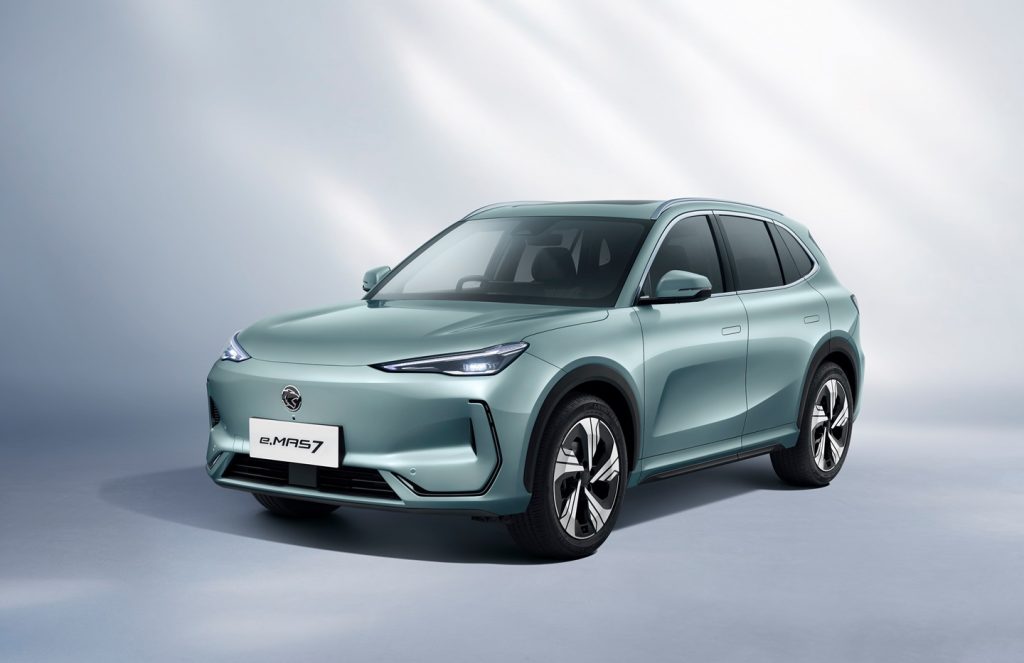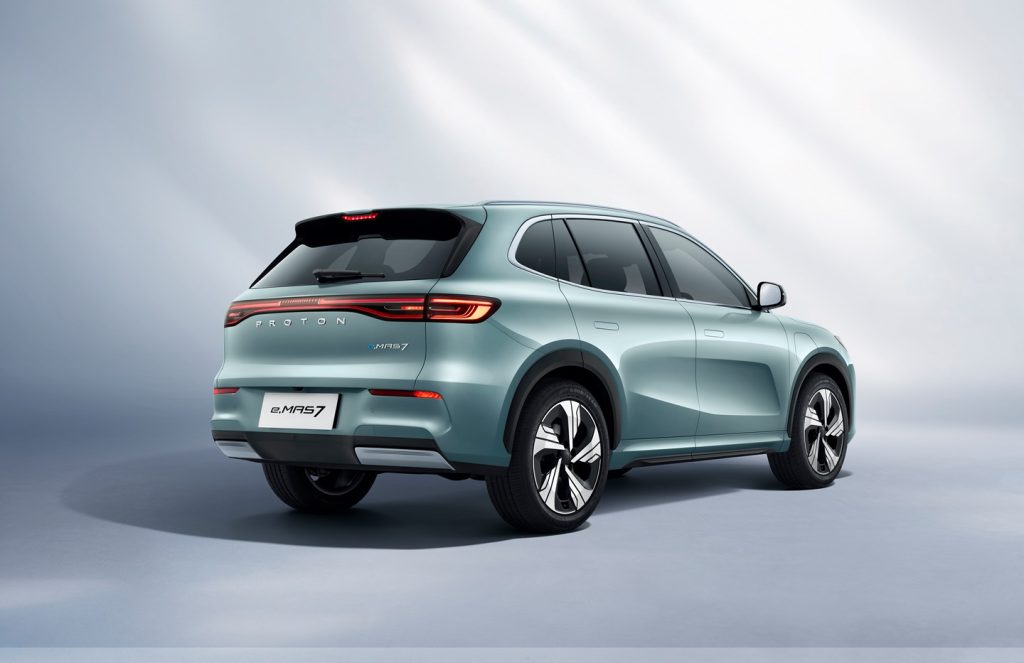
Sign up for daily news updates from CleanTechnica on email. Or follow us on Google News!
Last Updated on: 9th February 2025, 12:08 pm
Last December, Malaysian automaker Proton launched the e.MAS 7 — the first battery-electric vehicle in the company’s lineup. A product of its collaboration with Chinese automaker Geely, the made-for-Malaysia EV signifies a pivotal moment for the country’s automotive industry and a potential resurgence for Proton.
Two months after the launch of the e.MAS 7, the EV has gained significant traction in the Southeast Asian country, where fuel prices are one of the cheapest in the world, at $1.66 per gallon, and where fossil fuel cars still seemed comparatively cheaper to run.
Unveiled by Prime Minister Anwar Ibrahim, Malaysia’s first homegrown EV aligns with the nation’s ambitious National Energy Transition Roadmap (NETR), which aims for net-zero emissions by 2050, highlighting the carmaker’s commitment to sustainable mobility and innovation, marking a tangible step toward achieving these national goals.
Sources at Proton’s vehicles sales team told CleanTechnica that there are no official figures yet for the sales of the e.MAS7, but in one month, inquiries have reached over 10,000 with reservations nearing 4,000. This is data collected from among the first 30 Proton all-EV dealers across Malaysia created by Pro-Net, a wholly-owned subsidiary of Proton. Just a week after launch, 2,500 bookings were recorded.
Not Just Badge-Engineered

The e.MAS 7 is the result of extensive research and development, with Proton engineers insisting that “it isn’t just a badge-engineered EV.” As proof, Proton engineers claim that over 700,000 man-hours were devoted to its creation. The vehicle underwent rigorous testing, covering 100,000 km across Malaysia’s diverse terrains and weather conditions.
The collaboration with Geely has allowed the Proton to develop a global product tailored to the Malaysian market.
“By collaborating closely with its partner, Proton has successfully developed a global product that allows us to take a major step towards a sustainable future for Malaysia’s automotive industry,” Dr. Li Chunrong, Chief Executive Officer of Proton said during the launch.
“Drawing on over 40 years of experience in the local automotive industry, we have the expertise to develop a car from the ground up, from a robust supply chain to comprehensive aftersales support. We believe this will be a significant step forward, helping us transition to the next chapter thus reaffirming our commitment to innovation and growth in line with the nation’s vision for a greener, carbon-neutral future,” the Proton CEO added.
Global Modular Architecture
The e.MAS 7 is built on the Global Modular Architecture (GMA) platform and incorporates a 12-in-1 intelligent electric propulsion system, along with the innovative Cell-to-Body (CTB) battery architecture. It also features the advanced Aegis Short-Blade Battery, a new generation of lithium iron phosphate (LFP) battery, designed to enhance safety, efficiency, and performance. The C-segment electric SUV has achieved a 5-Star ASEAN NCAP rating and boasts L2-ADAS (Level 2 Advanced Driver Assistance System) and a 360-degree view camera.

The 12-in-1 electric drive unit delivers 160kW and 320Nm of torque, enabling the e.MAS 7 to accelerate from 0 to 100km/h in 6.9 seconds and brake from 100km/h to a standstill in 35 meters. The e.MAS 7 comes in Prime and Premium variants, offering different battery capacities and ranges. The Prime version has a 49.52kWh battery with a WLTP range of 345km, while the Premium variant has a 60.22kWh battery extending the range to 410km. Both variants support DC fast charging.
The interior of the e.MAS 7 prioritizes driver and passenger comfort, featuring ventilated seats, ample legroom, and 33 storage compartments. The infotainment system includes a 15.4-inch, 2.5K resolution touchscreen display with an integrated charging map, providing access to over 1,700 charging points across Malaysia, a number that is expected to grow through collaborations with charging point operators.
Launch prices for the first 3,000 customers are lower by RM4,000 ($900) for the Prime version at RM105,800 ($25,000) and RM119,800 ($27,000) for the Premium version. These introductory prices undercut the top-selling BYD Atto3, its closest competitor in Malaysia, by about RM10,000-30,000. ($2,250 – $6,800). It also competes with the Omoda E5, a Chery-brand vehicle, and the GAC Aion Y Plus.
This February the prices adjust to retail levels. Prices differ in the Malaysian main island called Peninsular Malaysia and in East Malaysia.
| Variant | Peninsular Malaysia | East Malaysia |
| Prime | RM 109,800 | RM 112,800 |
| Premium | RM 123,800 | RM 126,800 |
Crucial For The Malaysian Automotive Market
The e.MAS 7 launch is not just a milestone for Proton, but also a crucial step in regaining its foothold in the competitive Malaysian automotive market.
Pro-Net, the subsidiary company set up in 2022 as a fully owned subsidiary of Proton, is headed by a separate management team and is led by CEO Zhang Qiang. Quiang is also a veteran in the Chinese automotive industry.
“Protons were the best-selling SUV brand in Malaysia, and Pro-Net aims to replicate this success with Proton e.MAS in the EV segment. We know this is a very competitive segment, but we are fully confident in our offering and our goal is to continue innovating and enabling Malaysians from all walks of life to make that shift to sustainable mobility,” Quiang said in a press statement.
“Moving forward, we plan to export this latest model starting with Singapore, Trinidad & Tobago, Mauritius and Nepal next year, helping us to solidify our position in the international market and strengthen our commitment to providing eco-friendly, accessible mobility solutions globally,” Quiang concluded.
Proton: A Quick History
Proton is an acronym for “Perusahaan Otomobil Nasional” in Malay or “National Automobile Enterprise.” It might be unknown in the US market, but is considered an ASEAN brand envied by members states of the Association of Southeast Asian Nations.
Proton began in 1983, part of Malaysia’s industrialization strategy aimed at establishing a domestic automotive industry which was back then heavily dependent on imports. The Philippines was the darling of automobile assembly since the 70s and was considered the “Detroit of Asia” until the 80s. Government corruption and rising foreign exchange made carmakers — mostly the American and Japanese brands already manufacturing and exporting cars from the Philippines — look elsewhere. Thailand and Indonesia were locations, but not Malaysia.
Initially, Proton’s models were rebadged Mitsubishi vehicles, providing a foundation for learning and development. This initial phase allowed Malaysia to gain experience in vehicle assembly, manufacturing processes, and the automotive supply chain. In the early 90s, Proton was exporting vehicles to the right-hand drive ASEAN market and even over to the UK and selected parts of Europe. It developed left-hand drive models and exported in small quantities to the Philippines. Over time, Proton gradually transitioned towards designing and engineering its own vehicles, marking a significant step in building indigenous automotive capabilities.
While Proton enjoyed considerable domestic market share, it faced increasing competition from both established international brands and other emerging domestic players. Maintaining competitiveness required continuous investment in research and development, as well as navigating the complexities of the global automotive market.
e.MAS: Electrify Malaysia
A pivotal moment in Proton’s development arrived in 2017 with its strategic partnership with Geely, a leading Chinese automotive manufacturer. This collaboration injected fresh capital, cutting-edge technology, and modern management practices into Proton.
The Geely partnership facilitated the introduction of new models with improved quality, performance, and features, revitalizing Proton’s brand image and market presence.
It also created a new brand: e.MAS.
e.MAS is the all-EV brand that is organizationally under Proton but functionally independent. Set up in July 2024, the acronym stands for “Electrifying Malaysia.” The ‘e’ symbol to denote EVs, together with MAS, an abbreviation used for the country. It represents Proton’s aim of electrifying mobility for Malaysians with its new upcoming EV models.
The establishment of e.MAS provided Proton with access to Geely’s extensive research and development resources, accelerating its ability to innovate and compete in a rapidly evolving automotive EV landscape. Proton’s research and development policies are tied very much to Geely’s technologies which, in a way, strengthens its position in the Malaysian market but also creates opportunities for expansion in the broader Southeast Asian region, which will benefit from tariff breaks as part of the ASEAN Free Trade Act.
“The e.MAS brand and its products is an extension of Proton’s three core values of Innovative Technology, Reliability and International. This is the next step in the evolution of the company and in the coming months, there will be additional announcements to build brand recognition and product advocacy in the run up to the launch of the first Proton e.MAS EV in December this year,” Proton CEO Chunrong told journalists at a press conference in July last year.
Chip in a few dollars a month to help support independent cleantech coverage that helps to accelerate the cleantech revolution!
Have a tip for CleanTechnica? Want to advertise? Want to suggest a guest for our CleanTech Talk podcast? Contact us here.
Sign up for our daily newsletter for 15 new cleantech stories a day. Or sign up for our weekly one if daily is too frequent.
CleanTechnica uses affiliate links. See our policy here.
CleanTechnica’s Comment Policy




